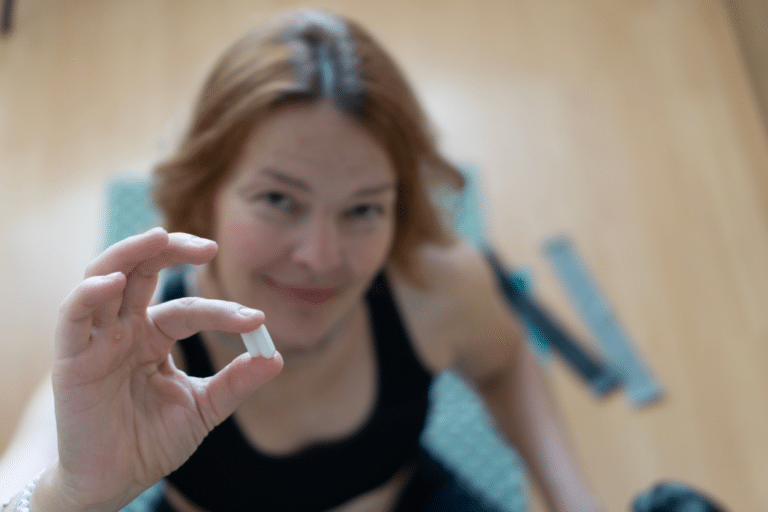The current COVID-19 (coronavirus) pandemic has caused chaos around the world (to say the least).
Watching the news and mindlessly scrolling social media to kill time is like feeding your lizard brain filet mignon and a good Cabernet. Your fat, happy lizard brain (amygdala) then sends your adrenals the message to crank out cortisol because sh*t’s gettin’ real! That part of your brain is there to try to keep you safe… it’s just doing its job. But that rise in cortisol is like gasoline on the anxiety fire. Are you feeling it?
Supply shortages, conflicting information, increasingly strict recommendations about being out in the world… all are fueling sporadic runs for toilet paper, hoarding of hand sanitizer and …more cortisol. And sustained levels of cortisol only serve to suppress the immune system over time.
Anxiety is absolutely normal at a time like this. None of us have had any practice for the situation. BUT, it is possible to get a handle on it and calm your nervous system. Doing so will help your body defend itself should you be exposed to the virus (and chances of this are LOW).
[bctt tweet=”High cortisol fuels anxiety, and over the long-term can cause your immune system to become suppressed. So what to do? Click here for some tips! #coronavirus #COVID-19 #cortisol #stress #selfcare #hormones #perimenopause #menopause #mindfulness #meditation #DrAnnaGarrett #AnnaGarrettAsheville” username=”DrAnnaGarrett”]
Here’s how to give your lizard brain a timeout:
1.) Start a gratitude journal. It is easy to focus on what you DON’T have right now. But what about what you DO have? Focus on this. Starting a gratitude journal is quick and easy. Each day, find 5 things to write down that you are grateful for. They don’t have to be big things. Puppy kisses count! This practice trains your mind to look for the positive things around you during your day. It absolutely works!
2.) Develop a mindfulness practice. Mindfulness is being aware. It’s noticing and paying attention to thoughts, feelings, and behavior. Mindfulness can be practiced at any time, wherever we are, whoever we are with, and whatever we are doing, by showing up and being fully engaged in the here and now. It lowers blood pressure, improves digestion, and relaxes tension. Not a bad deal when all that is needed is to pay attention, which sounds like something we should all be doing anyway (but often forget). Google ‘mindfulness practice’ for ideas on specific practices.
3.) Breathe. There are many breathing exercises you can do to calm anxiety. Here is one that works well:
-
- Sit in a straight-back chair with both feet on the floor.
- Rest your hands on your abdomen.
- Slowly count to four while inhaling through the nose and feel the abdomen rise.
- Hold that breath four counts.
- Then, slowly count to four while exhaling through the mouth—let the abdomen slowly fall.
- Hold your breath again for four counts before inhaling again.
- Repeat this exercise five to 10 times.
4.) Meditate. I recently read, “Stress Less, Accomplish More” by Emily Fletcher. She teaches a form of meditation called Ziva. Fifteen minutes twice a day is all it takes and the benefits are numerous… better sleep, lower anxiety levels, more energy. All things the perimenopausal and menopause crowd could use a lot more of now right now (and always).
5.) Move. Exercise is great for reducing anxiety. Yes, the gym is likely closed. But YouTube has a whole universe of workout routines, yoga, etc. Pick one, clear the living room floor and get moving!
6.) Get outside. If you are lucky enough to live in an area where you can get out in nature and avoid others, GO! Being out in nature has been scientifically shown to decrease rates of depression and anxiety.
7.) Turn off the TV and get off social media. No explanation needed.
There’s no denying that times are trying. This is a time for extreme self-care and stress reduction. Your job is to keep calm and know that this will pass. Inconvenient? Yep. Scary? Can be if you let your mind spin it that way. Try some of the tips above to calm and re-center yourself. All they require is a little of your time… which most of us have plenty of right now.
Dr. Anna Garrett is a menopause expert and Doctor of Pharmacy. She helps women who are struggling with symptoms of perimenopause and menopause find natural hormone balancing solutions so they can rock their mojo through midlife and beyond. Dr. Anna is the author of Perimenopause: The Savvy Sister’s Guide to Hormone Harmony. Order your copy at www.perimenopausebook.com.
Dr. Anna is available for 1-1 consultations. Find out more at www.drannagarrett.com/lets-




